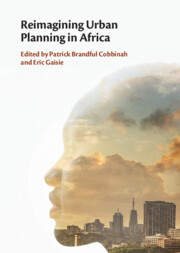Book contents
- Reimagining Urban Planning in Africa
- Reimagining Urban Planning in Africa
- Copyright page
- Contents
- Contributors
- Foreword
- Preface
- Acknowledgements
- Abbreviations
- Part I Understanding Sustainable Urban Planning in Africa
- 1 Reimagining African Cities
- 2 Annals of Urban Planning in Africa
- 3 New Cities in Africa and the Reimagination of Urban Planning
- 4 Informal Settlements and Pro-poor Urban Planning in African Cities
- 5 Urban Planning and Sustainable Land Governance in Africa
- 6 Urban Planning and Climate Change Action in Africa
- Part II Case Studies on Urban Planning in African Countries
- Part III Sustainable Urban Planning in Africa
- Index
- References
4 - Informal Settlements and Pro-poor Urban Planning in African Cities
The Luanda Socio-historical Narrative
from Part I - Understanding Sustainable Urban Planning in Africa
Published online by Cambridge University Press: 07 December 2023
- Reimagining Urban Planning in Africa
- Reimagining Urban Planning in Africa
- Copyright page
- Contents
- Contributors
- Foreword
- Preface
- Acknowledgements
- Abbreviations
- Part I Understanding Sustainable Urban Planning in Africa
- 1 Reimagining African Cities
- 2 Annals of Urban Planning in Africa
- 3 New Cities in Africa and the Reimagination of Urban Planning
- 4 Informal Settlements and Pro-poor Urban Planning in African Cities
- 5 Urban Planning and Sustainable Land Governance in Africa
- 6 Urban Planning and Climate Change Action in Africa
- Part II Case Studies on Urban Planning in African Countries
- Part III Sustainable Urban Planning in Africa
- Index
- References
Summary
Informal settlements are projected to host future increases in Africa’s urban population growth. This has led to calls within African urban scholarship and practice for a capable and enabled urban planning response that promotes inclusive and sustainable principles in urban planning and management. Tracing the scholarship on Angola, this chapter reviews the literature on the consolidation of informal settlements in Luanda to shed insights into this intractable challenge of urban planning and its socio-political and historical dimensions to foreground the imperative to reimagine the urban planning regime. It highlights post-colonial planning ambivalence, a centralised, and project-oriented urban planning approach to the challenge of informal settlements. The chapter submits that reimagining urban planning in Luanda, and African cities in general, demands a forward-looking planning praxis that de-centres urban planning from state control and builds local institutional capacity to integrate social equity, local participation, empowerment and experimentation within a pro-poor urban planning framework.
- Type
- Chapter
- Information
- Reimagining Urban Planning in Africa , pp. 52 - 69Publisher: Cambridge University PressPrint publication year: 2023



